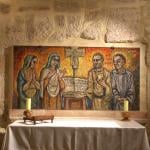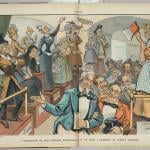Introducing the Gospel reading from John 21 this morning, Chris Schlect pointed out that Jesus instructs Peter to take up the commission of Israel. Israel was supposed to be light to the nations, but refused; Jesus tells Peter to do what Israel failed to do. That fits with a couple of other things. First, Peter, of course denies Jesus three times in an earlier chapter of John; so do the Jews (18:30; 18:39-40; 19:15). Peter is a representative Jew, but... Read more
















